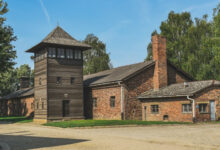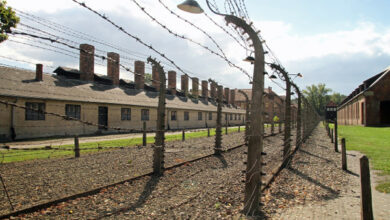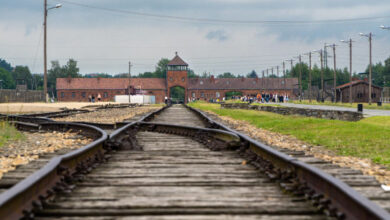Duration of the Auschwitz Tours and Visits
Planning Your Time at Auschwitz: Average Tour and Visit Durations
Visiting Auschwitz-Birkenau, the largest Nazi concentration and extermination camp from World War II, is a profound experience that brings you face-to-face with one of history’s darkest chapters. The impact of over a million lives lost there is as staggering as it is sobering.
As you plan your visit, understanding the options available for touring this significant site ensures that you can pay your respects and learn about the historical significance in a manner suited to your preferences. Your visit could vary in length; typically, you might spend anywhere from a few hours to a full day exploring.

Auschwitz guided tours are available and come in different formats, with some lasting approximately 3.5 hours, while others extend to about 6 hours, offering a more in-depth exploration.
If you prefer to reflect on your own, you also have the option to visit without a guide, which allows you to move at your own pace.
Reserving your entry in advance is crucial, as admission to the Auschwitz-Birkenau Memorial is free of charge, but the visitor numbers are carefully managed for preservation and respect.
Engaging with a guide-educator incurs a fee, but many find the context and information provided to be invaluable for a deeper understanding of the camp’s complex history.
To reserve a spot, visit the official memorial website whether you’re choosing to join a Auschwitz guided tour from Krakow or venture self-led.
Planning Your Visit and Tour Duration at Auschwitz-Birkenau
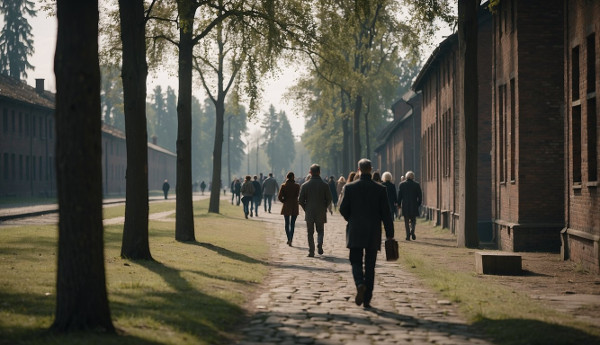
When visiting the Auschwitz-Birkenau Memorial and Museum, it’s essential to plan ahead to ensure a respectful and educational experience.
Consider the best times to visit Auschwitz, secure your tickets, and arrange your travel to make the most of your time at this important historical site.
Best Times to Visit Auschwitz

The memorial is open year-round, but the quietest months are typically January and February, as well as November and December outside of Christmas holidays. The busiest times are often during the warmer months, especially April to September.

Auschwitz-Birkenau Opening Hours and Tickets
Opening hours vary throughout the year, with the memorial generally accessible from 7:30 am to as late as 7:00 pm during peak summer months.
Entry is free, but it’s crucial to book your tickets in advance. Keep in mind that last entry times will be earlier than closing time; be sure to check ahead.
Travel and Accommodation
You can reach the museum by car or public transport from nearby cities such as Kraków, Katowice, or directly from Oświęcim.
Several hotels and guesthouses are available in these areas to accommodate overnight stays. Read also How to Prepare for Auschwitz Tour?
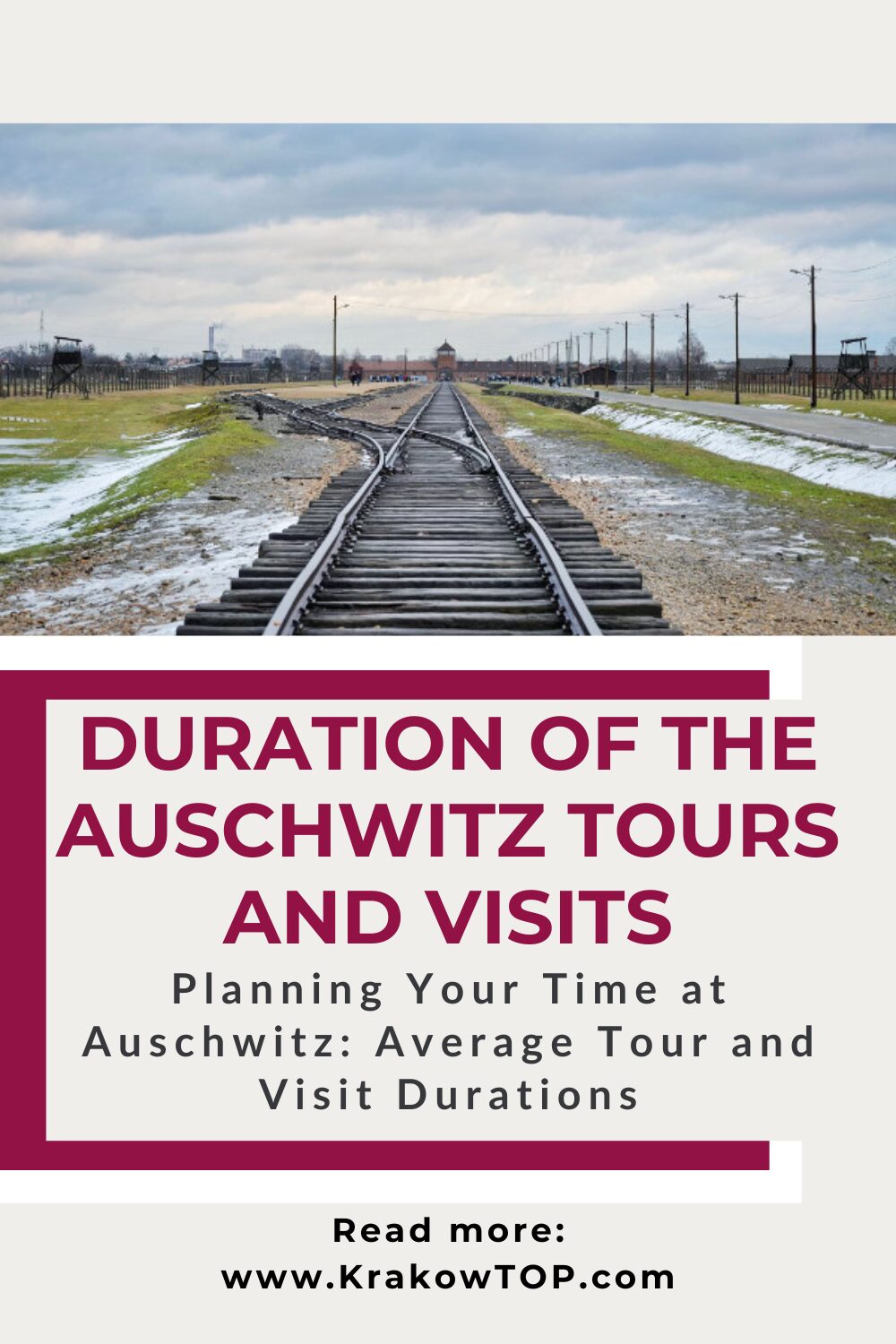
Auschwitz Guided Tours and Language Options
Auschwitz Guided tours, ranging from 2.5 to 6 hours, are available and recommended to gain a deeper understanding of the site’s history.
These tours are offered in various languages, including English, Polish, and German. Fees for guided tours are charged even though entry to Auschwitz is free.
Museum Exhibitions and Online Resources
Inside the museum, exhibitions offer detailed historical contexts using multimedia materials and archival photographs.
Additionally, online guided tours lasting approximately 2 hours provide an alternative or supplementary educational resource accessible via the museum’s website.
Rules and Regulations
Out of respect for the memorial site, follow all rules, which include a security check upon entrance.
Large bags are not allowed, but lockers are available. Eating, smoking, and bringing pets are not permitted on-site.
Read also:
- Why Visit Auschwitz
- Airports Near Auschwitz
- Arbeit Macht Frei Meaning
- Facts About Auschwitz
- How to Get to Auschwitz
- Krakow Auschwitz Distance
- Tickets to Auschwitz
- Auschwitz Dress Code
- Can You Eat at Auschwitz?
- Can You Take Photos at Auschwitz?
- How Old Do You Have to Be to Visit Auschwitz?
- How to Prepare for Auschwitz Tour
- What Do I Need to Know Before Going to Auschwitz?
- What not to do at Auschwitz
Additional Services and Accessibility
A limited number of wheelchairs are available for visitors with mobility difficulties. It is advised to contact the museum prior to your visit for specific support and accessibility options.

Educational Programmes
The Auschwitz-Birkenau Memorial offers educational programmes tailored for students, with dedicated staff available to enrich the learning experience. These programmes often require prior arrangement with the Auschwitz-Birkenau Foundation.
Nearby Historical Sites
While planning your visit, consider also exploring nearby historical locations in Poland. The town of Oświęcim itself and cities such as Krakow provide further context to the history of the region and World War II.
What to Expect During Your Visit to Auschwitz-Birkenau
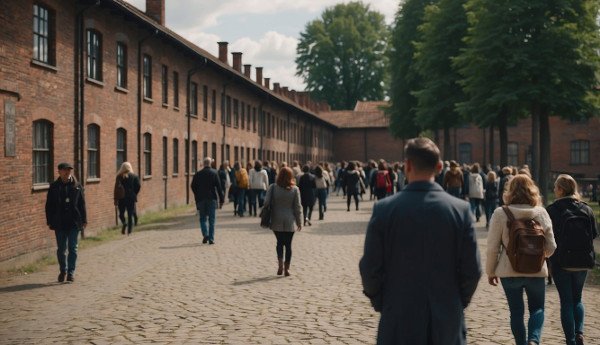
When you visit Auschwitz, you are embarking on a poignant journey through a site of immense historical importance. Your tour will take you through the haunting grounds of Auschwitz I and Birkenau, allowing for reflection on the atrocities of the Holocaust and offering a deeper understanding of this dark chapter of history.
Duration of Auschwitz Tours
Auschwitz I: Typically, a guided tour lasts about 2 hours, covering the infamous “Arbeit macht frei” gate, various exhibits, and preserved buildings within the main camp.
Birkenau: A further 1.5 hours is often spent at Birkenau, also known as Auschwitz II, exploring the expansive grounds and remnants of gas chambers and barracks.
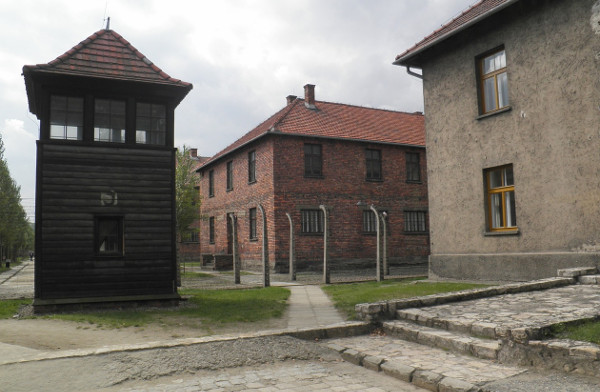
Paths and Segments of the Tour

- Auschwitz I: You will navigate through the barracks, where the museum has curated exhibitions detailing the lives of prisoners from different nations, like the Netherlands and Czech Republic, and view the harrowing “Death Wall”.
- Birkenau: The tour will guide you along the railway tracks leading to the camp and the remaining structures that bear witness to the scale of the Holocaust.

Reflection and Remembrance
- Moments of Silence: Spaces at both Auschwitz I and Birkenau are dedicated to remembrance, allowing you to pay your respects in silent reflection.
- Memorial Sites: Commemorative plaques and memorials can be found throughout, honouring survivors and the memory of the victims.
Acquiring Information
- Museum Website: For more information and to reserve your entry cards, visit the official Auschwitz Memorial website.
- Guide-Educators: Engaging a guide-educator is highly recommended for a more informative experience.
Handling Emotional Impact
- Support: Understand the visit can be emotionally taxing; take moments as needed.
- History: Prepare yourself for the intense history you will encounter, remembering the importance of respect and reflection during your visit.
After Your Auschwitz Tour
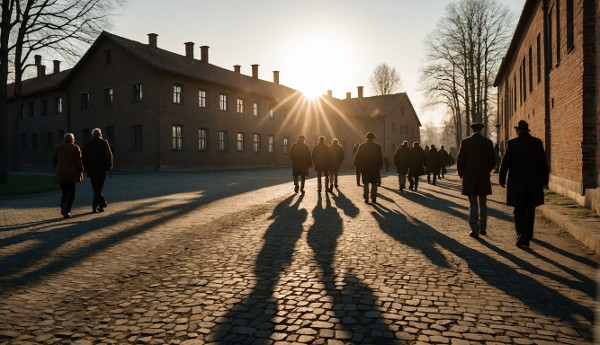
After visiting Auschwitz, the experience often continues through contemplation and community engagement. Your tour may have concluded, but the process of understanding and connecting with the history of this place is ongoing.
Discussion and Education
Your journey through Auschwitz has likely presented you with powerful imagery and narratives that provoke deep thought and raise questions. Engaging in discussions or educational sessions can be invaluable for processing these experiences.
Start Planning Your Krakow Trip Now!
- Unsure where to stay in Krakow? Discover top-rated Old Town and Kazimierz hotels with Booking.com.
- Book your airport transfer now and enjoy a hassle-free ride directly to your hotel. Driver will meet you at John Paul II International Airport Kraków–Balice.
- Take a Tour of Auschwitz. Arrange a visit to the Auschwitz-Birkenau Memorial and Museum to pay tribute and learn about this significant historical site.
⚠️ SUMMER BOOKING ALERT: Auschwitz tours are in high demand during the busy summer season. Secure your visit now to guarantee your preferred date and time slot. Last-minute availability cannot be guaranteed during this peak season. Due to increased visitor numbers in summer, it’s strongly recommended to book your tickets and tour to Auschwitz well in advance to secure your preferred dates and times! 🔖
- Explore the Fascinating Wieliczka Salt Mine! Book your guided tour today. These tours are very popular, so book early to avoid disappointment and ensure your spot.
- Looking for ideas? Check out our KrakowTOP.org recommended itineraries, including the famous Christmas Market, holiday events, and must-see Krakow attractions like Wawel Castle, Oskar Schindler’s Factory and St. Mary’s Basilica.
Reflection and remembrance are key components in making sense of the war crimes committed here. Consider participating in:
- Post-tour discussions organised by the Auschwitz-Birkenau Memorial or local education groups.
- Educational programmes to deepen your understanding of the Holocaust and its impact.
Community and Support Networks
The visit to Auschwitz can be emotionally taxing. You might find solace in support networks or survivor groups that offer a space for sharing and healing:
- Join community groups that focus on Holocaust history to share your experience and learn from others.
- Seek support from networks dedicated to preserving the memory of survivors and victims, promoting a message against war and crimes against humanity.
Remember, while your physical tour of Auschwitz has ended, your educational journey and the opportunity to contribute to a supportive community continue.
Extending Your Knowledge
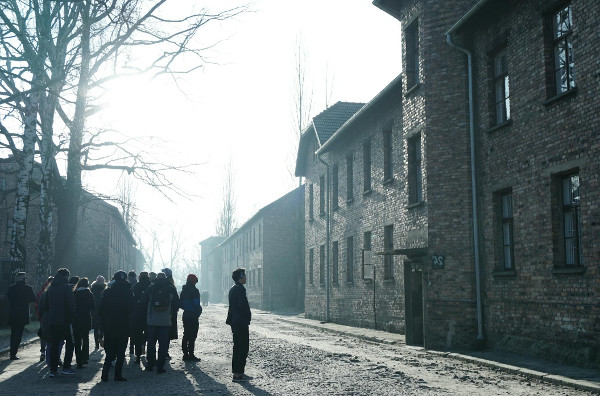
When planning your visit to Auschwitz, consider enriching your experience with additional sources and activities that deepen your understanding of the site’s historical significance.
Further Reading and Media
- Books: Seek out titles like “Night” by Elie Wiesel for a personal account or “Auschwitz: A New History” by Laurence Rees for historical analysis.
- Movies: Films such as “Schindler’s List” and “The Pianist” provide cinematic representations of Holocaust narratives.
Interactive Learning Opportunities
- Online Guided Tours: The Auschwitz-Birkenau Memorial offers guided tours in English daily at times like 13:30 or 14:30 depending on the season. Check online for booking on the memorial’s official website.
- ‘Auschwitz in front of your eyes’: Explore interactive exhibitions or virtual reality experiences that bring the history of Auschwitz to life from your own home.
Visiting Related Memorials and Museums
- Poland and Beyond: Extend your trip to include related sites such as the Oskar Schindler Factory in Kraków or the POLIN Museum of the History of Polish Jews.
- Germany: Visit memorials in Germany to understand the broader context of the Holocaust.
Engagement and Advocacy
- Auschwitz-Birkenau Foundation: Support the foundation’s work in education and preservation by participating in events or donating.
- Educational Programmes: Get involved with programmes that foster dialogue and reflection on the lessons of Auschwitz and their relevance today.

